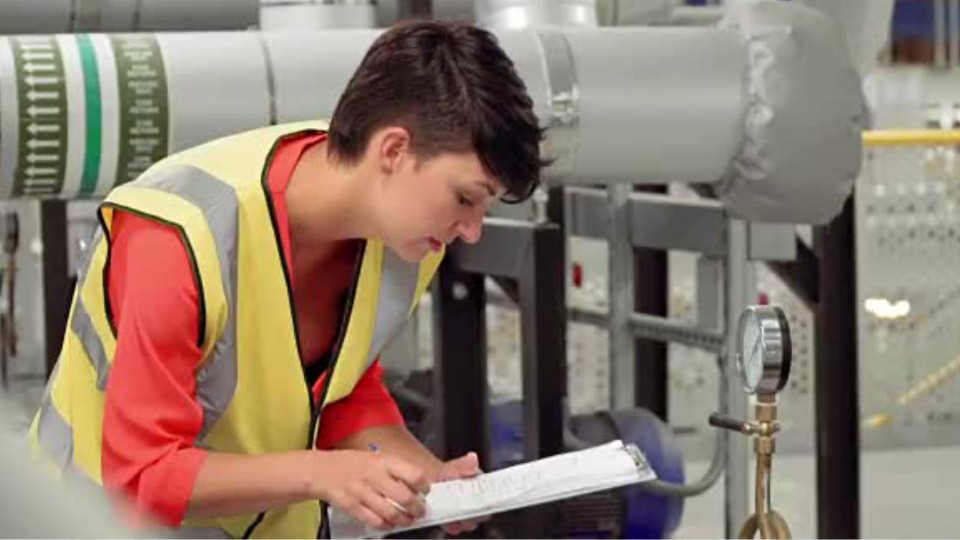Mechanical Engineer
Mechanical Engineer
Career Overview
Mechanical engineers design, develop, build, and evaluate machinery and systems for power generation, heating and air conditioning, engines, and machines. They are also involved in the installation, operation, and maintenance of these systems.
Education
Mechanical engineers typically need a bachelor’s degree in mechanical engineering or mechanical engineering technology. All states and the District of Columbia require mechanical engineers who sell services to the public to be licensed.
Future Outlook
Employment of mechanical engineers is projected to grow 4 percent from 2019 to 2029, about as fast as the average for all occupations. Mechanical engineers can work in many industries and on many types of projects. As a result, their growth rate will differ by the industries that employ them.
Work Environment
Mechanical engineers generally work in offices. They may occasionally visit worksites where a problem or piece of equipment needs their personal attention. Mechanical engineers work mostly in engineering services, research and development, and manufacturing.
Recommended High School Courses
- Math
- Physics
- Public Speaking
- Writing
- Communication
- Drafting
- Computer Methods in Mechanical Engineering
- English
- Calculus & Vectors
- Calculus 1
- Calculus 2
- Active Learning - Understanding the implications of new information for both current and future problem-solving and decision-making.
- Active Listening - Giving full attention to what other people are saying, taking time to understand the points being made, asking questions as appropriate, and not interrupting at inappropriate times.
- Complex Problem Solving - Identifying complex problems and reviewing related information to develop and evaluate options and implement solutions.
- Coordination - Adjusting actions in relation to others' actions.
- Critical Thinking - Using logic and reasoning to identify the strengths and weaknesses of alternative solutions, conclusions or approaches to problems.
- Judgment and Decision Making - Considering the relative costs and benefits of potential actions to choose the most appropriate one.
- Mathematics - Using mathematics to solve problems.
- Monitoring - Monitoring/Assessing performance of yourself, other individuals, or organizations to make improvements or take corrective action.
- Operation Monitoring - Watching gauges, dials, or other indicators to make sure a machine is working properly.
- Operations Analysis - Analyzing needs and product requirements to create a design.
- Persuasion - Persuading others to change their minds or behavior.
- Quality Control Analysis - Conducting tests and inspections of products, services, or processes to evaluate quality or performance.
- Reading Comprehension - Understanding written sentences and paragraphs in work related documents.
- Science - Using scientific rules and methods to solve problems.
- Service Orientation - Actively looking for ways to help people.
- Speaking - Talking to others to convey information effectively.
- Systems Analysis - Determining how a system should work and how changes in conditions, operations, and the environment will affect outcomes.
- Systems Evaluation - Identifying measures or indicators of system performance and the actions needed to improve or correct performance, relative to the goals of the system.
- Technology Design - Generating or adapting equipment and technology to serve user needs.
- Time Management - Managing one's own time and the time of others.
- Troubleshooting - Determining causes of operating errors and deciding what to do about it.
- Writing - Communicating effectively in writing as appropriate for the needs of the audience.
- Administration and Management - Knowledge of business and management principles involved in strategic planning, resource allocation, human resources modeling, leadership technique, production methods, and coordination of people and resources.
- Chemistry - Knowledge of the chemical composition, structure, and properties of substances and of the chemical processes and transformations that they undergo. This includes uses of chemicals and their interactions, danger signs, production techniques, and disposal methods.
- Clerical - Knowledge of administrative and clerical procedures and systems such as word processing, managing files and records, stenography and transcription, designing forms, and other office procedures and terminology.
- Computers and Electronics - Knowledge of circuit boards, processors, chips, electronic equipment, and computer hardware and software, including applications and programming.
- Customer and Personal Service - Knowledge of principles and processes for providing customer and personal services. This includes customer needs assessment, meeting quality standards for services, and evaluation of customer satisfaction.
- Design - Knowledge of design techniques, tools, and principles involved in production of precision technical plans, blueprints, drawings, and models.
- Education and Training - Knowledge of principles and methods for curriculum and training design, teaching and instruction for individuals and groups, and the measurement of training effects.
- Engineering and Technology - Knowledge of the practical application of engineering science and technology. This includes applying principles, techniques, procedures, and equipment to the design and production of various goods and services.
- English Language - Knowledge of the structure and content of the English language including the meaning and spelling of words, rules of composition, and grammar.
- Mathematics - Knowledge of arithmetic, algebra, geometry, calculus, statistics, and their applications.
- Mechanical - Knowledge of machines and tools, including their designs, uses, repair, and maintenance.
- Physics - Knowledge and prediction of physical principles, laws, their interrelationships, and applications to understanding fluid, material, and atmospheric dynamics, and mechanical, electrical, atomic and sub- atomic structures and processes.
- Production and Processing - Knowledge of raw materials, production processes, quality control, costs, and other techniques for maximizing the effective manufacture and distribution of goods.
- Category Flexibility - The ability to generate or use different sets of rules for combining or grouping things in different ways.
- Deductive Reasoning - The ability to apply general rules to specific problems to produce answers that make sense.
- Flexibility of Closure - The ability to identify or detect a known pattern (a figure, object, word, or sound) that is hidden in other distracting material.
- Fluency of Ideas - The ability to come up with a number of ideas about a topic (the number of ideas is important, not their quality, correctness, or creativity).
- Inductive Reasoning - The ability to combine pieces of information to form general rules or conclusions (includes finding a relationship among seemingly unrelated events).
- Information Ordering - The ability to arrange things or actions in a certain order or pattern according to a specific rule or set of rules (e.g., patterns of numbers, letters, words, pictures, mathematical operations).
- Mathematical Reasoning - The ability to choose the right mathematical methods or formulas to solve a problem.
- Near Vision - The ability to see details at close range (within a few feet of the observer).
- Number Facility - The ability to add, subtract, multiply, or divide quickly and correctly.
- Oral Comprehension - The ability to listen to and understand information and ideas presented through spoken words and sentences.
- Oral Expression - The ability to communicate information and ideas in speaking so others will understand.
- Originality - The ability to come up with unusual or clever ideas about a given topic or situation, or to develop creative ways to solve a problem.
- Perceptual Speed - The ability to quickly and accurately compare similarities and differences among sets of letters, numbers, objects, pictures, or patterns. The things to be compared may be presented at the same time or one after the other. This ability also includes comparing a presented object with a remembered object.
- Problem Sensitivity - The ability to tell when something is wrong or is likely to go wrong. It does not involve solving the problem, only recognizing there is a problem.
- Speech Clarity - The ability to speak clearly so others can understand you.
- Speech Recognition - The ability to identify and understand the speech of another person.
- Visualization - The ability to imagine how something will look after it is moved around or when its parts are moved or rearranged.
- Written Comprehension - The ability to read and understand information and ideas presented in writing.
- Written Expression - The ability to communicate information and ideas in writing so others will understand.
- Review technical documents to plan work.
- Design industrial processing systems.
- Design industrial equipment.
- Evaluate characteristics of equipment or systems.
- Confer with other personnel to resolve design or operational problems.
- Confer with technical personnel to prepare designs or operational plans.
- Recommend technical design or process changes to improve efficiency, quality, or performance.
- Direct industrial production activities.
- Investigate system, equipment, or product failures.
- Test performance of electrical, electronic, mechanical, or integrated systems or equipment.
- Create models of engineering designs or methods.
- Implement design or process improvements.
- Advise others regarding green practices or environmental concerns.
- Direct equipment maintenance or repair activities.
- Direct installation activities.
- Evaluate plans or specifications to determine technological or environmental implications.
- Analyze design or requirements information for mechanical equipment or systems.
- Design electronic or computer equipment or instrumentation.
- Identify new applications for existing technologies.
- Estimate operational costs.
- Prepare proposal documents.
- Document technical design details.
- Perform marketing activities.
- Supervise production or support personnel.
- Advise customers on the use of products or services.
- Research industrial processes or operations.
- Coordinate safety or regulatory compliance activities.
- Determine operational methods.
- Install production equipment or systems.
- Select tools, equipment, or technologies for use in operations or projects.
Approx Salary Expectation
Related Careers
References
Trend Analysis - Explorer the Market, Labour Market Information, Government of Canada https://www.jobbank.gc.ca/trend-analysis.
O*NET OnLine, National Center for O*NET Development, https://www.onetonline.org/.



